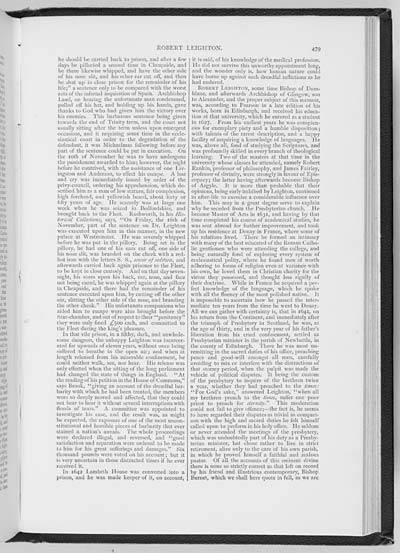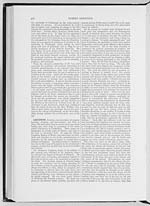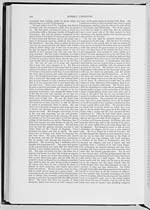479
he should be carried back to prison, and after a few
days be pilloried a second time in Cheapside, and
be there likewise whipped, and have the other side
of his nose slit, and his other ear cut off, and then
be shut up in close prison for the remainder of his
life;" a sentence only to be compared with the worst
acts of the infernal inquisition of Spain. Archbishop
Laud, on hearing the unfortunate man condemned,
pulled off his hat, and holding up his hands, gave
thanks to God who had given him the victory over
his enemies. This barbarous sentence being given
towards the end of Trinity term, and the court not
usually sitting after the term unless upon emergent
occasions, and it requiring some time in the eccle-
siastical court in order to the degradation of the
defendant, it was Michaelmas following before any
part of the sentence could be put in execution. On
the 10th of November he was to have undergone
the punishment awarded to him; however, the night
before he contrived, with the assistance of one Liv-
ingston and Anderson, to effect his escape. A hue
and cry was immediately issued by order of the
privy-council, ordering his apprehension, which de-
scribed him as a man of low stature, fair complexion,
high forehead, and yellowish beard, about forty or
fifty years of age. He scarcely was at large one
week when he was seized in Bedfordshire, and
brought back to the Fleet. Rushworth, in his His-
torical Collections, says, "On Friday, the 16th of
November, part of the sentence on Dr. Leighton
was executed upon him in this manner, in the new
palace at Westminster. He was severely whipped
before he was put in the pillory. Being set in the
pillory, he had one of his ears cut off, one side of
his nose slit, was branded on the cheek with a red-
hot iron with the letters S. S., sower of sedition, and
afterwards carried back again prisoner to the Fleet,
to be kept in close custody. And on that day seven-
night, his sores upon his back, ear, nose, and face
not being cured, he was whipped again at the pillory
in Cheapside, and there had the remainder of his
sentence executed upon him, by cutting off the other
ear, slitting the other side of the nose, and branding
the other cheek." His unfortunate companions who
aided him to escape were also brought before the
Star-chamber, and out of respect to their "penitency"
they were only fined ,7500 each, and committed to
the Fleet during the king's pleasure.
In that vile prison, in a filthy, dark, and unwhole-
some dungeon, the unhappy Leighton was incarcer-
ated for upwards of eleven years, without once being
suffered to breathe in the open air; and when at
length released from his miserable confinement, he
could neither walk, see, nor hear. His release was
only effected when the sitting of the long parliament
had changed the state of things in England. "At
the reading of his petition in the House of Commons,"
says Brook, "giving an account of the dreadful bar-
barity with which he had been treated, the members
were so deeply moved and affected, that they could
not bear to hear it without several interruptions with
floods of tears." A committee was appointed to
investigate his case, and the result was, as might
be expected, the exposure of one of the most uncon-
stitutional and horrible pieces of barbarity that ever
stained a nation's annals. The whole proceedings
were declared illegal, and reversed, and "good
satisfaction and reparation were ordered to be made
to him for his great sufferings and damages." Six
thousand pounds were voted on his account; but it
is very uncertain in those distracted times if he ever
received it.
In 1642 Lambeth House was converted into a
prison, and he was made keeper of it, on account,
it is said, of his knowledge of the medical profession.
He did not survive this unworthy appointment long,
and the wonder only is, how human nature could
have borne up against such dreadful inflictions as he
had endured.
ROBERT LEIGHTON, some time Bishop of Dum-
blane, and afterwards Archbishop of Glasgow, son
to Alexander, and the proper subject of this memoir,
was, according to Pearson in a late edition of his
works, born in Edinburgh, and received his educa-
tion at that university, which he entered as a student
in 1627. From his earliest years he was conspicu-
ous for exemplary piety and a humble disposition;
with talents of the rarest description, and a happy
facility of acquiring a knowledge of languages. He
was, above all, fond of studying the Scriptures, and
was profoundly skilled in every branch of theological
learning. Two of the masters at that time in the
university whose classes he attended, namely Robert
Rankin, professor of philosophy, and James Fairley,
professor of divinity, were strongly in favour of Epis-
copacy; the latter having afterwards become Bishop
of Argyle. It is more than probable that their
opinions, being early imbibed by Leighton, continued
in after-life to exercise a considerable influence over
him. This may in a great degree serve to explain
why he seceded from the Presbyterian church. He
became Master of Arts in 1631, and having by that
time completed his course of academical studies, he
was sent abroad for further improvement, and took
up his residence at Douay in France, where some of
his relations lived. There he formed an intimacy
with many of the best educated of the Roman Catho-
lic gentlemen who were attending the college, and
being naturally fond of exploring every system of
ecclesiastical polity, where he found men of worth
adhering to forms of religion even at variance with
his own, he loved them in Christian charity for the
virtue they possessed, and thought less rigidly of
their doctrine. While in France he acquired a per-
fect knowledge of the language, which he spoke
with all the fluency of the most polished native. It
is impossible to ascertain how he passed the inter-
mediate ten years from the time he went to Douay.
All we can gather with certainty is, that in 1641, on
his return from the Continent, and immediately after
the triumph of Presbytery in Scotland, he was, at
the age of thirty, and in the very year of his father's
liberation from his cruel confinement, settled as
Presbyterian minister in the parish of Newbattle, in
the county of Edinburgh. There he was most un-
remitting in the sacred duties of his office, preaching
peace and good-will amongst all men, carefully
avoiding to mix or interfere with the distractions of
that stormy period, when the pulpit was made the
vehicle of political disputes. It being the custom
of the presbytery to inquire of the brethren twice
a year, whether they had preached to the times:
"For God's sake," answered Leighton, "when all
my brethren preach to the times, suffer one poor
priest to preach for eternity." This moderation
could not fail to give offence;�the fact is, he seems
to have regarded their disputes as trivial in compari-
son with the high and sacred duties he felt himself
called upon to perform in his holy office. He seldom
or never attended the meetings of the presbytery,
which was undoubtedly part of his duty as a Presby-
terian minister, but chose rather to live in strict
retirement, alive only to the care of his own parish,
in which he proved himself a faithful and zealous
pastor. Of all the accounts of this eminent divine
there is none so strictly correct as that left on record
by his friend and illustrious contemporary, Bishop
Burnet, which we shall here quote in full, as we are

![]() Universal Viewer |
Universal Viewer | ![]() Mirador |
Large image | Transcription
Mirador |
Large image | Transcription
![]()

